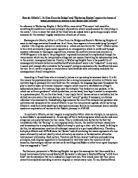John Galsworthy uses animalistic imagery throughout this extract to show the way that Irene has become trapped: “resemblance to a captive owl.” This comparison also shows the way Irene has become vulnerable, having lost her independence and freedom. This mirrors the situation of Desdemona in Shakespeare’s ‘Othello’. In this scene Desdemona is entirely helpless, Othello having already decided what must be done as an alpha male: “sweet soul, take heed of perjury: thou art on thy death bed.” Shakespeare’s choice of language, for example, his use of imperatives, “Down, strumpet!” makes it clear to the audience how much in control Othello is. This control is echoed in Soames, who speaks with great authority and power: “take your hated body...out of my house...Get out of my sight”. Soames commands his wife here in a way that suggests he views her as a possession, who should not disobey him, emphasised in Galsworthy’s use of the image of Irene “huddled in the fur”, as though she is a belonging. Again Shakespeare reflects this idea in Othello, with the handkerchief used as a dramatic device embodying Desdemona’s belonging to Othello, her supposed giving it away driving him to madness: “I saw my handkerchief in’s hand. Thou dost stone my heart.” Neither Soames nor Othello can see the fault in their own actions, demonstrated by Galsworthy through rhetorical questions: “Why should I suffer? What have I done?” Irene, however, is left in a helpless place, the animalistic imagery continuing, likening her to a trapped bird, her spirit crushed and giving up, “a bird shot and dying, taking farewell of all that is good – the sun and air and its mate.” This comparison also links back to Irene’s now dead lover Bosinney, her partner, without whom she feels she is unable to function.
Shakespeare uses stichomythia to create a passionate atmosphere. Short dramatic lines such as ‘it is too late’, build tension in the audience. John Galsworthy also uses speech to create tension but does so via the exposure of Soames’ thoughts. ‘Take away that pitiful white face’. Soames’ outburst is made particularly striking in the way that Galsworthy withholds excessive speech up until this point. Unlike Shakespeare who employs continuous dialogue and only one stage direction in this extract, to create a sense of a never ending flow of emotion.
The structure used in Othello is used in the build up of tension, for instance the stichomythia used towards the end of the extract. This technique is commonly utilised to dramatic effect in plays. The structure in Othello is generally used advance the narrative and to further increase the build up of tension towards the dramatic climax at the end of the play. In the Forsyte Saga the structure allows the author to progress and elaborate on the metaphors used. Galsworthy uses the structure to put emphasis on certain words or phrases: 'so they sat, by the firelight, in the silence, one on each side of the hearth'. Typically of a novel the structure shows the progressive thoughts of the narrator and isn't necessarily as linear as that in a play (ie Othello).
Wider Reading:
The poem My Last Duchess also carries the theme of adultery and extreme example of conflict in a relationship.
Robert Browning doesn’t make it clear whether the woman is guilty, but the Duke, like Othello is guilty of jealousy. He doesn’t believe she treats her husband and different to any other men ‘all and each’, ‘she liked whate’er she looked on, and went everywhere’, suggesting she flirted alot, not that the Duke has any proof.
The repetition of ‘that spot of joy’ emphasises how the fact her smile wasn’t just reserved for him bothered him, so much so that he used the harsh language like Ann Galsworthy’s choice of ‘Get out of my sight’ here, ‘that in you disgusts me; here you miss, or exceed the mark’, this shows his dark side and makes the reader question whether he killed her himself without knowing what she had done, similar to the way Othello acts on rage of his pride being damaged.
The Duke also seems to be very possessive of the Duchess as is Othello and Soames Forsyte. Here he opens the poem ‘That’s my last Duchess painted on the wall’ immediately highlighting he owns the painting, but also implies he owns her in person. He also seems to like the fact he can control who looks at the painting, ‘the curtain I have drawn for you’, but couldn’t control who looked at his wife when she was alive. Additionally, in comparison to the imperatives Shakespeare and John Galsworthy use, Browning stresses the Duke’s power through his quite forceful request, ‘will’t please you sit and look at her’, almost as if the Duke is desperate for his audience to understand his anger, he states ‘I gave commands’, yet it seems she didn’t obey him, hence he killed her, ‘then all smiles stopped together’.







